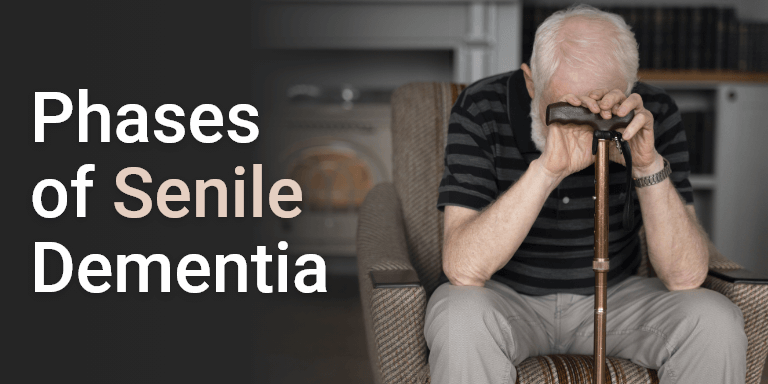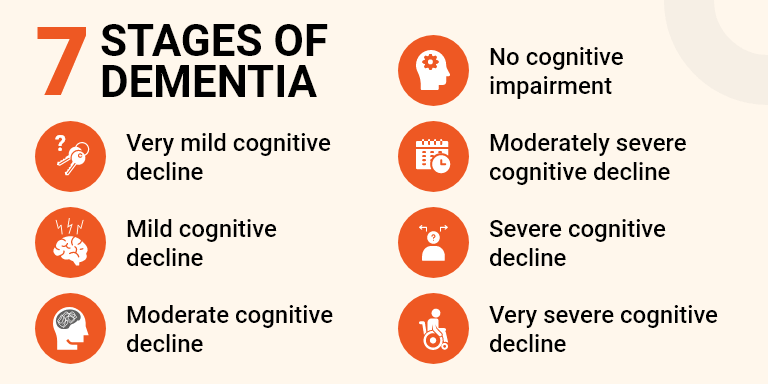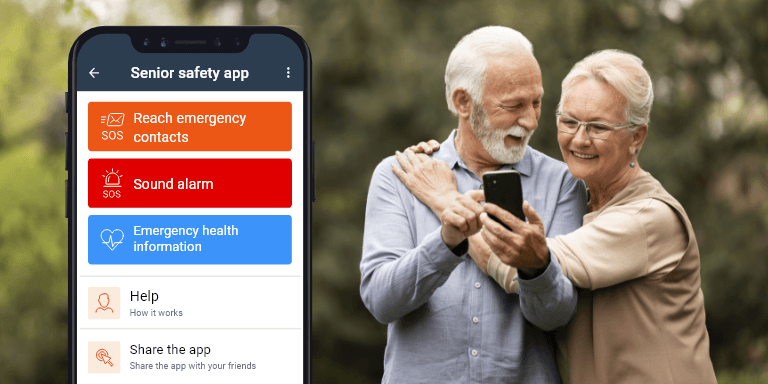
A category of diseases that cause deterioration of mental functions and memory loss is known as dementia. Senile dementia is a progressive disease that occurs due to physical changes in the brain. For some patients, dementia progresses quickly, while others may take years to reach advanced stages. Every dementia patient is unique, and the disease can progress differently for each, but people with dementia typically share similar symptoms.
Some of the most commonly diagnosed types of dementia are:
- Alzheimer’s disease
- Vascular dementia
- Parkinson’s disease
- Dementia with Lewy bodies
- Frontotemporal dementia
- Mixed dementia
Seven stages of dementia
 There are seven recognized stages of dementia, and although the progressiveness of the disease can vary from patient to patient, the seven stages of dementia typically follow a specific path. Each level presents new symptoms or a worsening in existing ones. Knowing what to be aware of and on the lookout for through each of the 7 stages of dementia can help you assess the care needs of your loved one.
There are seven recognized stages of dementia, and although the progressiveness of the disease can vary from patient to patient, the seven stages of dementia typically follow a specific path. Each level presents new symptoms or a worsening in existing ones. Knowing what to be aware of and on the lookout for through each of the 7 stages of dementia can help you assess the care needs of your loved one.
Health care professionals use a comprehensive tool known as the Global Deterioration Scale to evaluate the seven stages of dementia in elderly patients. Often referred to as the GDS, this trusted scale allows doctors and caregivers to determine how quickly dementia is progressing and what symptoms can be expected through each phase. Using a dementia stages chart helps caregivers and health care professionals monitor and track the health status of elderly dementia patients against stage-related symptoms.
Table of Contents
- Stage 1: No cognitive impairment
- Stage 2: Very mild cognitive decline
- Stage 3: Mild cognitive decline
- Stage 4: Moderate cognitive decline
- Stage 5: Moderately severe cognitive decline
- Stage 6: Severe cognitive decline
- Stage 7: Very severe cognitive decline
- Understanding how to care for a loved one with dementia
- Exploring the Senior Safety App
Table of Contents
- Stage 1: No cognitive impairment
- Stage 2: Very mild cognitive decline
- Stage 3: Mild cognitive decline
- Stage 4: Moderate cognitive decline
- Stage 5: Moderately severe cognitive decline
- Stage 6: Severe cognitive decline
- Stage 7: Very severe cognitive decline
- Understanding how to care for a loved one with dementia
- Exploring the Senior Safety App
Stage 1: No cognitive impairment
The first thing that comes to mind for most when they hear the term “dementia” is memory loss. It may come as a surprise, however, that stage 1 dementia exhibits no cognitive decline and mental function remains normal. A patient going through the first three stages of dementia typically does not exhibit enough symptoms to receive a diagnosis. Although some mild cognitive impairment may present itself, stages 1, 2, and 3 on the GDS are recognized as pre-dementia stages.
Stage 2: Very mild cognitive decline
Patients with stage 2 dementia experience simple memory mistakes, like forgetting where they put their car keys, or recalling the name of someone familiar to them. Age-related forgetfulness is common with senior adults, and health care providers and caregivers often do not give much thought to such a mild impairment. Stage 2 is referred to as “age-associated memory impairment” on the GDS.
Stage 3: Mild cognitive decline
Although stage 3 dementia doesn’t generally have a major impact on the day-to-day functioning of dementia patients, cognitive and memory problems become more regular and much more noticeable to loved ones and caregivers. A person in stage 3 of dementia is said to be suffering from mild cognitive decline, also known as mild cognitive impairment (MCI).
According to the National Institute on Aging, 8 in 10 people with MCI will go on to develop Alzheimer’s disease within the next seven years. Mild cognitive impairment often precedes more severe dementia stages, so it’s vital to recognize the signs of stage 3 and seek medical advice right away.
Stage 3 dementia symptoms:
- Forgetting appointments or scheduled events
- Losing things, forgetting names, and minor memory loss
- Getting lost while traveling
- A decrease in work performance
- Difficulty finding the right words
- Verbal repetition
- Challenges with organization and concentration
- Trouble with complex tasks and problem-solving
- Problems with driving like getting lost or forgetting where they are going
Stage 4: Moderate cognitive decline
A person is not typically diagnosed with dementia until they are in stage 4 or beyond. At stage 4, the person exhibits clear, visible signs of cognitive impairment and changes in personality become evident. These are significant symptoms of dementia. The medical term for stage 4 dementia is moderate cognitive decline. This stage is officially diagnosed as mild dementia by the GDS.
At this stage, healthcare providers, family members, and caregivers will likely notice tell-tale signs that dementia is getting worse, including more difficulties with language and reduced problem-solving skills.
Stage 4 dementia symptoms:
- Social withdrawal
- Emotional mood swings
- Lack of responsiveness
- Reduced intellectual sharpness
- Trouble with routine or basic tasks
- Forgetting recent events
- Denial of symptoms
Stage 5: Moderately severe cognitive decline
Stage 5 marks the onset of what many medical professionals refer to as the “mid-stage” of the seven stages of dementia. The patient may no longer be able to carry out normal activities of daily living (ADLs), like bathing or dressing, or Instrumental activities of daily living (IADLs) without assistance.
This stage of dementia often lasts between 2 to 4 years, although every patient will progress at a unique rate. At this stage, the patient will require more intense supervision and support. They can often remember who they are and who their children are, but may not remember where they live, where they went to highschool, or who their grandchildren are.
Stage 5 dementia symptoms:
- Pronounced memory loss, including personal details and current events
- Wandering or getting lost
- Confusion and forgetfulness
- Disorientation and sundown syndrome become present
- Further reduced mental sharpness and problem-solving abilities
Stage 6: Severe cognitive decline
By the time a patient enters stage 6, they will require the help of a caregiver to perform basic daily activities like using the toilet, eating, and other basic self care needs. Seniors experiencing this stage of moderately severe dementia may have difficulty interacting with others or regulating sleep. They may also behave inappropriately in public. This is also often the stage of dementia where health care providers, family members and other loved ones begin to contemplate care options.
Stage 6 dementia symptoms:
- Difficulties with Sleep
- Urinary or bowel incontinence
- Anxiety and aggression
- Personality changes that can include paranoia or delusions
- Inability to perform ADLs
- Pronounced memory loss
- Inability to recognize loved ones and others previously familiar to them
Stage 7: Very severe cognitive decline
Stage 7 is considered late stage dementia, and patients can no longer care for themselves. At this stage, patients have typically lost all verbal ability and movement becomes severely impaired. Bodily functions, like the ability to chew, swallow, and breathe, are disrupted in late-onset dementia.
Stage 7 dementia symptoms:
- Inability to speak
- The inability to move without help and lack of physical coordination
- Impaired bodily functions
Understanding how to care for a loved one with dementia
Coming to terms with a loved one’s dementia diagnosis and knowing what to expect as the disease progresses is vital to making the most of the time you have together.
There are a variety of ways to support a loved one through the progressive stages of dementia.
- Have meaningful, positive conversations using effective dementia communication strategies.
- Consider exploring dementia treatment options and therapies.
- Create a dementia care plan.
- Join a support group for caregivers and loved ones.
- Use of elderly monitoring devices to ensure your loved one is safe at all times.
Exploring the Senior Safety App
 You cannot put a price on peace of mind when it comes to the safety of a loved one suffering with dementia. Senior Safety App is a FREE, unobtrusive activity tracker for seniors built to keep seniors safe. Senior Safety App remotely monitors phone location and is used to protect against falls, wandering, online scams & abuse around the clock. Senior Safety App is built on a platform used by hundreds of thousands of users, across 97 countries, to keep their loved ones safe.
You cannot put a price on peace of mind when it comes to the safety of a loved one suffering with dementia. Senior Safety App is a FREE, unobtrusive activity tracker for seniors built to keep seniors safe. Senior Safety App remotely monitors phone location and is used to protect against falls, wandering, online scams & abuse around the clock. Senior Safety App is built on a platform used by hundreds of thousands of users, across 97 countries, to keep their loved ones safe.
Download and install the Senior Safety Alert app for free from the Google Play Store. The Senior Safety App can be configured in seconds, enabling caregivers to monitor alerts, reports, and location remotely using their smartphones or computers. When the Senior Safety App is active you will receive alerts for emergency help requests, falls with the phone, phone inactivity for extended period of time, app installs or uninstalls, entry/exit from geo-locations (buildings, streets, cities or neighborhoods), network changes (sim card change), and low battery alerts. New features are being added all the time. Touted as the best senior emergency alert app, it is a life-saving addition to a senior’s care plan.
